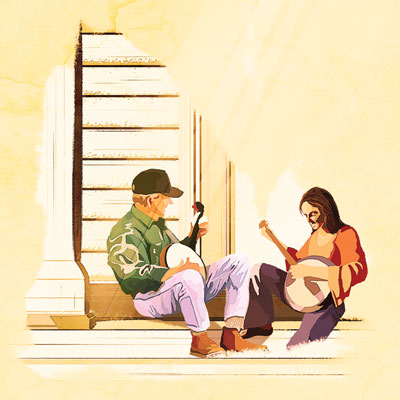Submitted by Anonymous on
“I felt like my PawPaw, even though he was physically there, was no longer really there.”
 What compelled you to write the script?
What compelled you to write the script?
I started the script before my PawPaw died as it occurred to me that the only reference I had for his condition was the literary figure of King Lear. My PawPaw was suffering from extreme dementia and could no longer recognize me. I lived in California, far away from him in South Carolina, which made that worse. When he died I was instantly regretful of all the time I didn’t get with him and started writing this play. It’s a love letter to him, an apology, and a reckoning, as well as a chance to discover a man I thought I knew so well.
What does your mother, PawPaw’s daughter, think of the play?
Mom has seen me perform it! She was moved and, I think, a little nervous. But the point of the play is to come together, to honor her father, and to confront the darker instincts we have, to turn away from illness and death. But by confronting them (even laughing at them as The Heath does), we can digest and dispel them.
What was the most important thing you learned in researching and discovering your grandfather’s life after he died?
So much! His war history is truly profound to me. What he managed to survive was unreal. I had never read his letters that he wrote from inside a POW prison during the war, which were chilling. I also never knew he called my grandmother “sugar babe” when they were courting.
How did the addition of the banjo and the songs come about?
I was inspired to add banjo to the play when I remembered how much PawPaw loved Flatt and Scrugg’s bluegrass music. It felt like a crazy challenge to myself. The songs are simple but full of emotion and heart. The big ending song, Storm Still, was the most cathartic to write. It really allows me to say, “I love you, I miss you, I’m proud of you,” to my grandfather.
How does the raging storm in King Lear figure into the story?
The storm represents the tumult and uncertainty of my grandfather’s Alzheimer’s disease, the damage that it can do to a family, the unpredictable sadness and ‘natural disaster’ of dementia. It also represents what I feel as my betrayal of my grandfather by not showing up for him enough when he was sick. His disease and death was a storm, and survivors like me are often left with the emotional wreckage afterwards.
What goes through your mind when you realize that someone you’ve loved and known your whole life no longer remembers you?
It’s pretty shocking and terrible. I felt like my PawPaw, even though he was physically there, was no longer really there. He wasn’t the same man any more. In many ways I felt terrible for him because I know he’d not want to be remembered in such a state. It’s heartbreaking. This is the reality and urgency of Alzheimer’s and dementia research. If we could find a solution to these deteriorating diseases of the mind, it would be such a gift to the world. It would give dignity back to so many. It would save so many lives and families.
What advice would you offer a friend if she told you today that her grandfather had just been diagnosed with Alzheimer’s?
Show up. Be present. Play music. Tell stories. Get them talking and record it. Say I love you. Take care of yourself.

The Heath runs February 13 – March 10, 2019.
